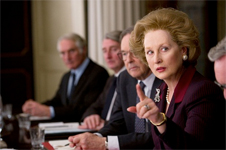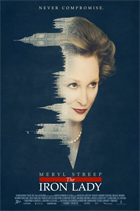The Iron Lady
|  The title of The Iron Lady comes from the nickname given to Margaret Thatcher by the Soviet media in the mid-1970s, but it may just as well be used to describe Meryl Streep, who gives us another of her impressive historical disappearing acts—one of the current cinema’s greatest special effects. With the same misleading sense of effortlessness she used to morph into the trilling chef Julia Childs in Julie & Julia (2009), she becomes not just the controversial first woman ever elected British prime minister, but the character at multiple stages of life. If the casting seems too obvious, it is only because no one else could have managed the transformation so impressively. The title of The Iron Lady comes from the nickname given to Margaret Thatcher by the Soviet media in the mid-1970s, but it may just as well be used to describe Meryl Streep, who gives us another of her impressive historical disappearing acts—one of the current cinema’s greatest special effects. With the same misleading sense of effortlessness she used to morph into the trilling chef Julia Childs in Julie & Julia (2009), she becomes not just the controversial first woman ever elected British prime minister, but the character at multiple stages of life. If the casting seems too obvious, it is only because no one else could have managed the transformation so impressively.Granted Alexandra Roach is brought in to play Thatcher when she was in her late teens and early 20s, but Streep plays her from her 30s until well into her 80s, embodying each stage with an impressive physical presence that will ring true to those familiar with the media images of Thatcher in her prime and move those who have ever wondered what she must be like now that she is rarely seen in public and apparently suffering from dementia. Streep wears Thatcher’s body in her prime with authority and in her twilight with an all-too human sense of frailty, reminding us that, however iron-willed she was as a conservative politician, she is still decidedly human (the make-up and latex appliances used to age Streep by several decades is blessedly effective, as opposed to the rubbery obviousness that hampered many scenes in Clint Eastwood’s J. Edgar). Reminding us that Thatcher was a human being is perhaps The Iron Lady’s greatest accomplishment, quite the opposite of Oliver Stone’s silly and confused W. (2008), which turned the similarly controversial George W. Bush into a political caricature surrounded by Hollywood A-listers in recent historical drag. Director Phyllida Lloyd (whose tone deaf and clumsy handling of the musical Mamma Mia! a few years ago suggested no sense of subtlety or refinement) and screenwriter Abi Morgan (who co-wrote Steve McQueen’s Shame) follow the accepted biopic protocol in focusing the film’s narrative arc primarily on Thatcher’s greatest hits, from her political awakening while listening to a Conservative Party stump speech in her teens, to her momentous election as Prime Minister and subsequent challenges ranging from the IRA hunger strikes to war in the Falkan Islands. The chronologically sequential depictions of Thatcher’s past are interspersed with sequences depicting her in the present tense living in relative seclusion with only the ghost of her beloved husband Denis (Jim Broadbent) to keep her company. The use of Denis as a convenient device to immediately engender sympathy toward Thatcher (Poor old woman, some will immediately think) will certainly strike a certain segment of viewers as crass and a bit overbearing, but it generally works, especially since it allows Streep to establish Thatcher’s world-weary, no-nonsense approach to life (she chastises him for using too much butter on his bread) and her all-too-human vulnerabilities. Most people’s image of Thatcher as the political iron lady runs head-on into the imagery of an ailing older woman still trying to maintain her personal dignity and sense of independence. This is not to say that the film is deliberately trying to short-circuit politics in favor of sentimentality. Rather, it is putting a human face on someone most people know only as a media icon that is either unquestionably celebrated or unquestionably denounced. Thatcher’s politics were as steely as she was determined, and anyone seeking to brand her a cruel reactionary must first deal with the difficulties she faced being taken seriously as a woman in politics. Even if you disagree with her policies, it is hard to deny the power of her resolve, not to mention the deep sense of commitment that informed her political decisions. Streep’s performance in The Iron Lady, beyond simply mimicking Thatcher’s public persona, trades heavily on the intensity of her convictions, whether right or wrong. The film is not out to convince anyone that Thatcher was a great prime minister, but simply that she did what she did because she firmly believed it was the right thing to do—a sentiment that is all too often considered quaint if not outright dismissed. Copyright ©2011 James Kendrick Thoughts? E-mail James Kendrick All images copyright © The Weinstein Company |
Overall Rating: 

 (3)
(3)


